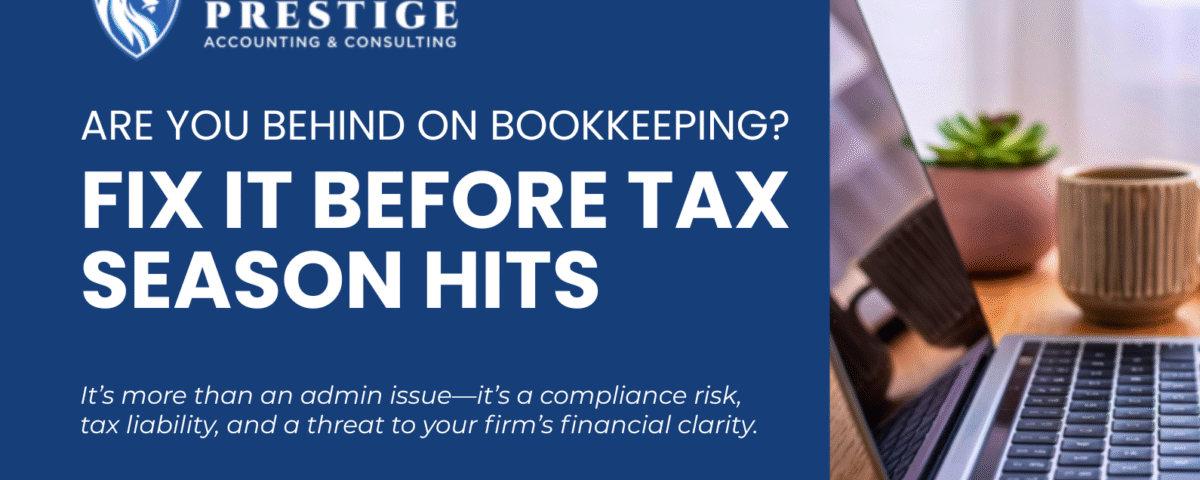
Final Call: What to Do Before December 31 to Cut Your Tax Bill
November 4, 2025
Payroll and Contractor Prep: Avoid 1099 and W-2 Mistakes This Year
November 11, 2025Are You Behind on Bookkeeping? Fix It Before Tax Season Hits
Attorneys don’t go to law school to become bookkeepers. But when your books fall behind, it’s not just a minor admin task—it’s a compliance risk, a tax liability, and a serious threat to your firm’s financial clarity.
If you’re still reconciling Q1 (or haven’t opened your accounting software since April), you’re not alone. But waiting until January to get caught up is a guaranteed way to enter tax season blind—and stressed.
Here’s why now is the time to clean up your books, and how law firm owners can do it without derailing daily operations.
📉 The Hidden Cost of Messy Books
Behind on categorizing expenses? Missing trust reconciliations? Operating off your bank balance? That kind of guesswork has real consequences.
Here’s what we see in firms that fall behind:
- Overpaying or underpaying taxes because income is unclear
- Missed deductions due to uncategorized transactions
- Trust account compliance risks that could trigger bar issues
- No idea what’s safe to draw as owner income
- Hiring decisions made with fuzzy data
- Burnout from scrambling to answer your CPA’s questions at the last minute
Sound familiar?
⏰ Why October–November Is the Sweet Spot for Catch-Up
By the time January hits, your CPA will need clean books to file your return—or prepare your S Corp payroll if you’re an owner-employee.
But that catch-up work takes time. And doing it under pressure usually leads to:
- Errors from rushed reconciliation
- Missed opportunities (like forgotten deductions or tax-saving decisions)
- Delays in filing, which can trigger penalties
Getting caught up now gives you breathing room—and gives your CPA what they need to make smart tax-saving moves before December 31.
⚖️ Legal-Specific Bookkeeping Risks
For law firms, the stakes are higher.
- Have you reconciled your trust account monthly?
- If not, you could be violating IOLTA rules—and your bar association won’t accept “we’re behind” as an excuse.
- Are firm expenses clearly separated from personal ones?
- Intermingling funds can pierce the veil of liability protection—and get messy in the event of an audit.
- Have you classified income properly?
- Contingency fee firms, for example, must account for client costs and revenue timing accurately.
🧠 The Psychology Behind Procrastination
Most attorneys don’t ignore bookkeeping out of laziness. They do it because:
- They don’t know what “caught up” actually looks like
- They’re embarrassed to admit how far behind they are
- They think doing it later will somehow be easier
The truth? Ignoring it makes the pain worse. And catching up with a trusted team who knows law firm finances makes it easier and faster than you think.
✅ A Clean-Up Game Plan
If you’re behind, here’s what a professional CPA firm (like ours) will help you do:
- Reconcile all bank, credit, and trust accounts
- Categorize uncategorized transactions
- Check for missing or duplicate income
- Fix trust account ledger errors
- Generate updated financial reports (P&L, balance sheet, etc.)
- Audit for compliance gaps and deduction opportunities
- Build a system to stay current going forward
💡 Pro Tip: We often find law firms with 4–5 figures in missed deductions simply due to uncategorized or misclassified expenses.
🧾 What Bookkeeping Cleanup Unlocks (Before Year-End)
Once your books are clean, you can:
- Make accurate estimated tax payments
- Max out deductible expenses before December 31
- Adjust S Corp salary and distributions with confidence
- Plan your cash flow and hiring for Q1
- Sleep better knowing your trust account is audit-ready
🎯 Real Talk: This Is About More Than Taxes
Clean books don’t just protect your license and reduce your tax bill. They also help you:
- Make strategic decisions with data
- Feel confident investing in your growth
- Finally stop the “feast or famine” cycle
🧠 A Final Thought from The Lawyers’ CPA
The longer you wait to fix your books, the more expensive—and risky—it becomes.
We work exclusively with law firms to clean up books, reconcile trust accounts, and build a financial system that supports growth—not stress.
📅 You still have time. But not much.
Let’s go into tax season prepared—not panicked.




